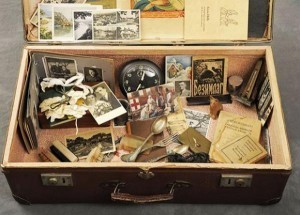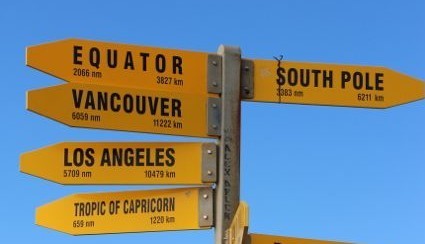Rolf Potts's Blog, page 55
September 17, 2013
Warrnambool whales
Vagablogging :: Rolf Potts Vagabonding Blog
A couple of weekends ago we saw the most amazing thing: 12 Southern Right Whales
Six mother and calf pairs lounged about on the surface of the water, seeming basking in the late winter sun. Their great puffs of breath sending salt spray high into the air. The babies lolling about and splashing in the shallow water. It was the most spectacular whale sighting we’ve ever had the privilege of witnessing, and it was from shore.
Warrnambool is not high on anyone’s tour list in southern Australia. It’s a little beach town just past the western end of the Great Ocean Road. In the summer it’s hopping with beach goers and holiday makers, but in the winter it seems to roll up in it’s sidewalks for a nap. It’s in the winter that the whales come.
July through September the mothers can be relied upon to turn up in “nursery bay” as the locals call it, to calve and raise their young until they’re strong enough to make the long swim to their far off feeding grounds. This particular bay is shallow and protected, so their is less risk of sharks and orca preying on their young. For three whole months they hang out and watch the people watching them.
Here’s the spectacular part: They can be seen from shore!! The whales are only a few hundred meters off of the beach. So close that I spent my morning worrying a bit about them becoming beached, but apparently that’s not a problem. There are no boats in the water harassing them, only a few surfers riding the breaks that are well inside the whales’ nursery. A viewing platform has been built and folks come from far and wide to watch the whales and celebrate the return of a species that was hunted almost to extinction!
I often feel conflicted, writing about places to go and see wildlife or “eco-tourism” as it seems to just increase the risk to the animals. In this case, I’m so excited to tell every traveler I know about this quiet little corner of Australia with a very big secret. There is no risk to the animals and it may just be your best chance ever to see many whales, mother and calf pairings, at close proximity with absolutely no stress or danger to the animals whatsoever.
We took some video of one of the baby whales having a play:
Original article can be found here: Warrnambool whales
September 15, 2013
Travel is one of life’s most essential metaphors
Vagablogging :: Rolf Potts Vagabonding Blog
“The commonality and familiarity of travel may also be seen in the fact that travel is the most common source of metaphors used to explicate transformations and transitions of all sorts, we draw upon the experience of human mobility to define the meaning of death (as a “passing”) and the structure of life (as a “journey” or “pilgrimage”); to articulate changes of social and existential conditions in rites of initiation (of “passage”). …If the essence of a metaphor or a symbol is the use of the familiar to grasp the less familiar or ineffable, then the universality of symbols and rites of passage testifies to the sheer normality of the experience of travel.”
–Eric J. Leed, The Mind of the Traveler: From Gilgamesh to Global Tourism (1991)
(1991)
Original article can be found here: Travel is one of life’s most essential metaphors
September 12, 2013
Has it all been done?
Vagablogging :: Rolf Potts Vagabonding Blog
Recently I was asked by a magazine to look at possibilities for a travel article. Specifically about some Western European locale that featured prominently in World War II, but hadn’t been covered too widely. Turns out it was not an easy task. While scouring my map of Western Europe looking for places that hadn’t been done a thousand times already, the thought entered my mind, “has it all been done before?” Just as when I’m playing my guitar and writing a tune, I wonder if every possible permutation of chords has already been explored.
The more I stared at the map, my eyes raking over familiar place names, the more I began to despair at the thought of “it all having been done.” Later that day, while talking to a friend, she mentioned in an off-hand way how her grandpa, who’d recently died, and was given a deeply moving military burial. “Oh,” I said. “I’m sorry to hear that. He was really nice. Actually, I had no idea he’d been in the military.”
“Neither did I”, she said. “He only mentioned it a couple times that I recall, and I was a kid, so I didn’t really care.” Evidently she found out while talking to his friends and other relatives at the funeral. She proceeded to tell me the harrowing and sometimes grisly story about her granddad’s exploits in World War Two, where as a young man he fought bravely in France and Germany, and was awarded medals for valor.
“I didn’t know this stuff till recently,” she said, a tone of amazement in her voice. “And I never saw the medals or knew about them till they were taken out of a drawer and put in his coffin with him. He had lots of them. He was always so quiet; he kept all of that stuff inside.”
Reflecting on the conversation, I realized that, yes, there are still great stories to be told about amazing lives; stories that often go unknown until that life is extinguished. It’s just a matter of asking; of seeking. Every location holds its own stories too, just like people. I recall the many times I have found that a flower-blanketed field was the scene of an epic medieval battle that decided the fate of nations, or that a pile of stones in the countryside was once a soaring abbey that witnessed a coronation of a great king beneath its vaulted ceilings.
And that is our job as travel writers, and as people fortunate enough to be able to tell these stories: We need to seek, we need to ask. Because there are stories worth telling, and they hide in the most unlikely of places, like a quiet valley, a broken-down complex of haunted stones, and a kind old man’s heart.
Original article can be found here: Has it all been done?
September 10, 2013
Getting lost? There’s an app for that!
Vagablogging :: Rolf Potts Vagabonding Blog
There’s something to be said for getting lost.
I rather like it, actually. Taking off with no destination, exploring a city by braille, and the serendipity that inevitably arises as a result are intoxicating. There are days in which the last thing I want is a map, or directions, or to “get there” in the most expeditious manner.
And then… there are the other days. The days when I’m lost and it’s maybe not comfortable, or fun, or safe. There’s that moment when you look around and think, “Well this is no good…” and you realize you’re in the wrong neighbourhood, it’s almost dark and you have no idea where you are.
My husband pointed me towards an article about new app called Kovert this week that is a savvy solution in that moment. It’s a GPS for your phone that gives directions via vibration in your pocket rather than voice or visual. One blast for port, two for starboard; that kind of thing. So now, you’re walking down the street, feeling your directions instead of with your nose in your phone display. Your mind and your eyes are free to take in your surroundings. You’re not painting a target on your ass with the double whammy of an expensive piece of equipment and the announcement that you’ve got no idea where you are since you’re clearly following it down the street.
I like this idea from two perspectives: 1. increasing safety and decreasing the presence of obvious high-theft items. 2. increasing presence in a place instead of face time with a device.
What are your thoughts? Any travel apps that enhance your experience?
Original article can be found here: Getting lost? There’s an app for that!
September 8, 2013
The best motivation for travel is not escape, but to meet life head-on
Vagablogging :: Rolf Potts Vagabonding Blog
“Travel — especially by people who rarely do it — if often dismissed as a luxury and an indulgence, not a practical or useful way to spend one’s time. People complain, “I wish I could afford to go away.” Even when I did the math and showed that I often spent less money while on the road than staying home, they looked at me with skepticism. Reasons for not traveling are as varied as complex as the justification for any behavior. Perhaps people feel this way about travel because of how it’s so often perceived and presented. They anticipate and expect escape, from jobs and worries, from routines and families, but mostly, I think, from themselves — the sunny beach with life’s burdens left behind. For me, travel has rarely been about escape; it’s often not even about a particular destination. The motivation is to go — to meet life, and myself, head-on along the road. There’s something in the act of setting out that renews me, that fills me with a feeling of possibility. On the road, I’m forced to rely on instinct and intuition, on the kindness of strangers, in ways that illuminate who I am, ways that shed light on my motivations, my fears. Because I spend so much time alone when I travel, those fears, my first companion in life, are confronted, resulting in a liberation that I’m convinced never would have happened had I not ventured out. Often, the farther afield I go, the more at home I feel. That’s not because the avenues of Harare are more familiar to me than the streets of New York, but because my internal wiring relaxes and finds an ease of rhythm that it rarely does when at home.”
–Andrew McCarthy, The Longest Way Home (2012)
(2012)
Original article can be found here: The best motivation for travel is not escape, but to meet life head-on
September 5, 2013
Wicked World releases issue 2
Vagablogging :: Rolf Potts Vagabonding Blog
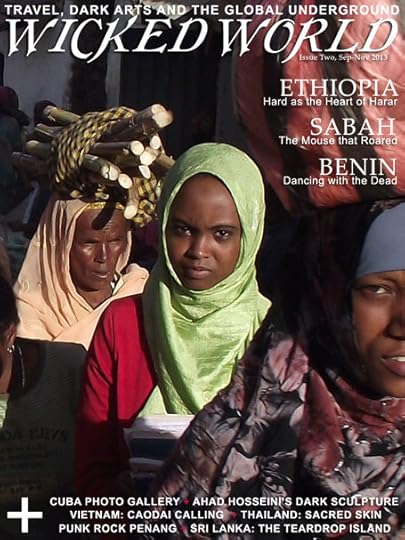 I take this week’s chance to announce the release of the second issue of Wicked World, a digital magazine project that dares to be different. Unrestricted by commercial considerations, it remains free to challenge, question, and tell the truth about the business of international travel. We’re not here to sell expensive guided tours, round-the-world gap year tickets, or travel insurance, but exist primarily to provide a platform for the kind of honest, alternative and irreverent travel writing that wouldn’t normally find a home in more mainstream publications.
I take this week’s chance to announce the release of the second issue of Wicked World, a digital magazine project that dares to be different. Unrestricted by commercial considerations, it remains free to challenge, question, and tell the truth about the business of international travel. We’re not here to sell expensive guided tours, round-the-world gap year tickets, or travel insurance, but exist primarily to provide a platform for the kind of honest, alternative and irreverent travel writing that wouldn’t normally find a home in more mainstream publications.
In Issue Two you will find articles on: the walled Muslim city of Harar in Eastern Ethiopia; the Sultan of Sulu and the disastrous recent invasion of Sabah in Borneo; frenzied voodoo ceremonies in Benin; the sculpture of Iran’s Ahad Hosseini; the strange religious cult of Caodai in Vietnam; Thailand’s spirit tattoos; the sacred city of Anuradhapura in Sri Lanka; rapidly changing Cuba; and the punk rock scene in Penang, Malaysia.
You can read the present issue in digital format clicking here.
If you feel like you have something worthwhile and relevant to contribute to the Wicked World project, or would simply like to know more, then feel free to contact either marco@wickedworld.net or tom@wickedworld.net.
Original article can be found here: Wicked World releases issue 2
September 3, 2013
Vagabonding Field Report: The temporary Black Rock City and Burning Man
Vagablogging :: Rolf Potts Vagabonding Blog

Cost/day: Ticket cost is $380, but once at Burning Man, the only things you can buy are coffee and ice, so about $5/day.
What’s the strangest thing you’ve seen lately?
Oh, how can I possibly choose? There was the girl who was carrying an alien, the Pulpo Mechanico octopus art car that towered above me and shot flames, but maybe the best thing was that I found Waldo!!

Describe a typical day:
Well, let’s just say, I didn’t get much sleep. I was always afraid of missing something. Black Rock City is a city that invites your inner child to come out and play. After watching the stunning sunrises from the Temple, I usually went to the steam bath for some lovely self-care. Then I would ride around the desert looking at the art. I once found an Oasis way out in the desert where there were couches set up and a guy was serving frozen coffee. I met lots of interesting people out there. I also found a white building and went inside. There was white fur on the ground that everyone was lying on and white streamers hanging down that tickled your body when the wind blew. Everyone napped or looked up at the sky and beautiful music was playing. It was the best thing ever. I did so much dancing. Twenty-four hours a day at Black Rock City, there is dancing. I also misted people with icy water with peppermint oil in it and people would act like I was saving their lives. Trying to figure out what you could do to give others the best possible experience was what everyone was trying to do, and it leads to such a beautiful, loving community.

Describe an interesting conversation you had with a local:
I went to a talk on Fear Walking. It was about doing things in life even though you fear them. We got to break into groups and talk about what we wanted to do even though we feared it. The girl I was talking to really wanted to quit her job and travel. I am in the middle of doing that. We discovered we had the same fears, but that the fear was a lot less than our regret would be if we never attempted to live our dreams.

What do you like about where you are? Dislike?
I love how loving Black Rock City is. We all build it, and there is such respect. This is the only event in the world with this many people where you won’t see litter on the ground. There is also no judgment at Burning Man. People who come here are here to show acceptance and love. Everyone is always hugging you and smiling at you and you go really deep in your conversations with other people. Their acceptance brings out vulnerability and openness and trust. In the default world, people are so quick to judge others, and I think that’s what causes most of the worlds problems. People don’t feel free to express themselves and they close off. They don’t share their pain. What we have is fear which I think is the opposite of love. I also love the non-commercialism of Burning Man. Nothing is for sale (except for coffee and ice). Life becomes more about each moment and what we can do to give someone else a magical experience. The thing I dislike? Well, there was a nine-mile line to get in. That was a bit hard to deal with. But, it was so worth it.
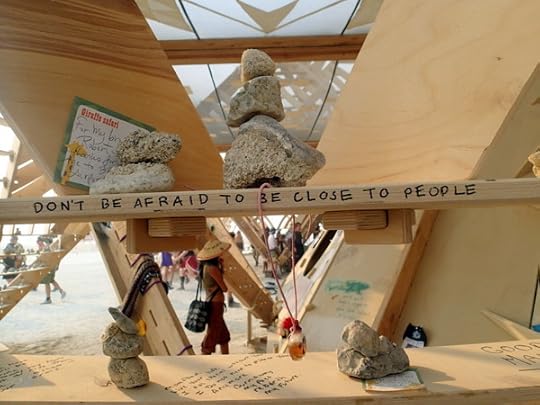
Describe a challenge you faced:
Leaving! Leaving is always hard. I am trying to remind myself to be just as vulnerable outside of Black Rock City as I am in Black Rock City. To go up and hug someone I don’t know. To bring a little of that City to the outside world. To be close to others even though they might judge me. To realize that the person judging me is missing out on the moments that could be living inside their own life and that their judgement is really about them. To be as fearless outside of that City as I am inside that City.
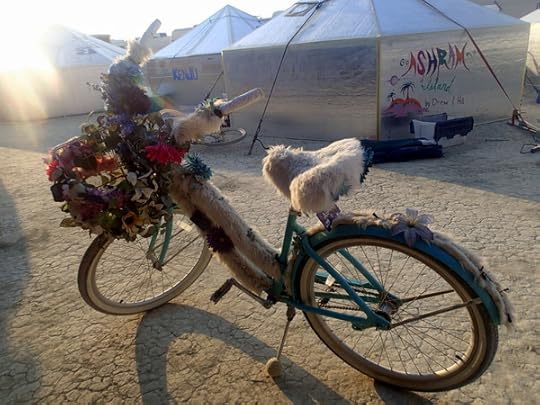
What new lesson did you learn?
How fast life goes. It’s all temporary. Each moment is something we have the choice to create. The next second it will be gone and we can’t hold onto it. To be more spontaneous, more joyful, more loving. To tell people not just the good things about you, but to also share your fears and pain. We all feel the same things, and you just never know who you may be helping by sharing everything about yourself. Most of all, I learned how beautiful this world is and the people in it.

Where next?
I am saying goodbye to Portland, OR where I’ve been living and saying goodbye to my corporate job. I am saying hello to a life of travel and writing. San Miguel de Allende is where I will be in less than two weeks. Goodbye Comfort. Hello Adventure. (I got this)!
For more about my travels and great advice on beaches and islands, check out my website
This Way To Paradise and my Facebook page!
Original article can be found here: Vagabonding Field Report: The temporary Black Rock City and Burning Man
How was your trip?
Vagablogging :: Rolf Potts Vagabonding Blog
If you’ve been traveling for any length of time then you’ve been asked the same questions a million times:
Where are you from?
Where are you going?
Where have you been?
What’s your favourite place so far?
Which place has the best food?
Isn’t it dangerous?
The questions get tiresome sometimes, but I understand why people ask. To be honest, I ask them, of other travelers, myself more often than I should. People are interested. They’re curious. The life of a traveler is one that seems shrouded in mystery and romance, when really it’s more likely to be dust and exhaustion on any given day. And so we answer: enthusiastically on the days when we feel like world conquers and the last of the free people. Patiently on the days when it feels tiresome. Philosophically on the days when we’ve had too much wine or the news from someplace we love brings sad tidings and we remember a place that no longer exists.
There is one question that I truly cannot bear. Every time it is asked, I’m at a loss. I have no idea how to answer. It stumps me without fail.
How was your trip?
My internal monologue runs something akin to this:
Define “trip”
Which trip?
How in what sense? Physically, emotionally, mentally, spiritually?
Are they looking for a list of destinations?
What are they really asking?
Is my trip over?
Don’t they realize they’re a stop on the trail?
Memories run like old movie tape through my head in a flickering parade of colour, sound and smells: things there really are no words for. I remember a hundred people and a thousand conversations and those handful of life changing moments, none of whom or which can be done justice in a trite answer. How do I sum up the awe of sunrise over Angkor Wat, with the ghosts of hundreds of years of history watching with me? Or the deep meaning of one sentence gifted by an ancient Vietnamese man who took an afternoon to teach our children brush drawing: Life is short, but art is long. How can I sum up the depth of my aversion to Jakarta? Or the absolute relief of sinking into the cool waters of Chieow Laan Lake? Or the physical joy of finding salad in Bali? It’s impossible to communicate the internal lessons absorbed by climbing a 75 meter high tree with no safety gear in Australia, or found on the bamboo floor of a meditation room in Ubud, or standing beneath the killing tree in Cambodia, or lighting incense sticks at the feet of a giant golden Buddha on a sweltering afternoon.
How was your trip?
Great question. Terrible question.
How was your entire year while I was gone? Quick, sum it up for me in three snappy sentences. Can’t do it? Indeed.
And so, I do my best. I can recite the stats and the stories. I can play back the highlights reel; but that’s not really answering the question. I can’t tell you how my trip was, because it has nothing to do with the quantifiable externals, and it has everything to do with all of the things I learned, the ways I changed, and what the world taught me that I hadn’t seen yet. If you have a day, and you really want to know, a traveler can begin to scratch the surface in answer to that question.
More to the point: my journey isn’t over, and neither is my “trip.” Perhaps it never will be, which makes the question a hard one to answer.
There is one voyage, the first, the last, the only one.
— Thomas Wolfe
Original article can be found here: How was your trip?
September 1, 2013
Everything science gives us immediately becomes normative
Vagablogging :: Rolf Potts Vagabonding Blog
“Everything science gives us immediately becomes normative. To an eighty-year-old man, a computer is this amazing device that creates instantaneous access to limitless information. He can’t get his head around it. But to a twenty-year-old man, the computer is a limited machine that costs too much and always needs to be faster. Because human live finite lives, all technological advances immediately feel banal to whatever generation inherits their benefits. Any advance can be appreciated only by the handful of people who happen to exist within the same time period of that specific technology’s introduction. …To a seven-year-old, a computer doesn’t even qualify as technology. It’s like a crowbar.”
–Chuck Klosterman, The Visible Man: A Novel (2011)
(2011)
Original article can be found here: Everything science gives us immediately becomes normative
August 29, 2013
Tips for Hostel Accommodation in China
Vagablogging :: Rolf Potts Vagabonding Blog
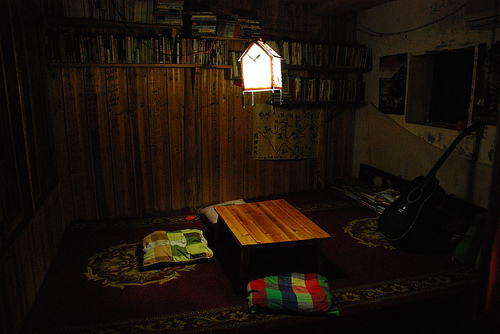
When it comes to travel on a shoestring – my favorite style – the amount of money you spend or save on accommodation becomes a serious matter. There was a time when travelling to China was very, very cheap, and accommodation options where everywhere. Unfortunately, with China experiencing the economic boom, things have changed quite a lot. On the other hand, the development of Chinese tourism has also created a wide range of opportunities for all kinds of travellers, making it quite easy and affordable to find budget accommodation in comfortable, clean beds. Where?
Simple: at YHA, the first wonder of Chinese Budget accommodation!
Everywhere and anywhere in China, my first option is to look for the YGA symbol, which means Youth Hostelling International. This international franchise is widely spread all around the major tourist destinations of China, and at times also a bit out of the beaten track. Generally, this kind of hostels are the Chinese equivalent of the Southeast Asian guesthouses, are full of travelers, good vibes and dispense good travel information. Besides, they are generally very cheap to stay in, they provide free wi-fi connectivity, restaurant facilities, self-service kitchen areas, luggage storage options and, very important if you cannot speak any Mandarin Chinese, can help you book your onward train or flight tickets. You will pay a little surcharge, but believe me, it is worth to save time and effort.
Most likely if you are looking for the cheapest option, you will end up staying in a dormitory: have no fear, as YHA dormitories are usually big, equipped with your own locker, sparkling clean, spacious and comfortable. They are also great places to meet other travelers. Dorms usually come in different sizes, and are generally equipped with several rows of bunk beds able to accommodate 4, 6, 8, and even up to 10 or 12 people. Dorms are also very cheap, as they start from 20 to 40/50 yuan per bed. So far, I only found the higher end of the spectrum (50 yuan) in Shenzen, Beijing and Shanghai.
One of the best services provided is definitely the onward-travel hostel booking service: each hostel will have many cards advertising other hostels in the next “tourist towns”. Just glance trough and pick the one you like most, tell the receptionist and he/she will make a call to reserve your bed at your next destination. Generally, you will have to pay half of the fee to the hostel you are reserving from and once you get to your destination, you will pay the difference. It works like Hostelworld, but over the phone, and most times free train or bus station pick-ups are guaranteed.
Original article can be found here: Tips for Hostel Accommodation in China
Rolf Potts's Blog
- Rolf Potts's profile
- 323 followers




